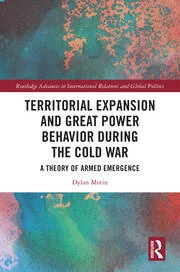
Territorial Expansion and Great Power Behavior During the Cold War: A Theory of Armed Emergence
저자: Dylan Motin(아시아연구소 방문연구원)
Motin examines great powers’ reactions to the rise of new powers in bipolar international systems by exploring an understudied problem: the rarity of armed emergence after 1945.
The book focuses on Egypt, Iraq, Syria, and Vietnam; the few minor powers that attempted to emerge as great powers through force during the Cold War. Geography and existing powers’ reactions are analyzed as the two key factors determining a nation’s attempts at territorial expansion to achieve power on the global political stage. This systematic investigation of previously overlooked cases has profound implications for the scholarship on the rise and fall of great powers.
In a context where territorial conquest is returning worldwide, scholars studying international relations, international security, and strategic studies should find valuable insights in this realist take.

